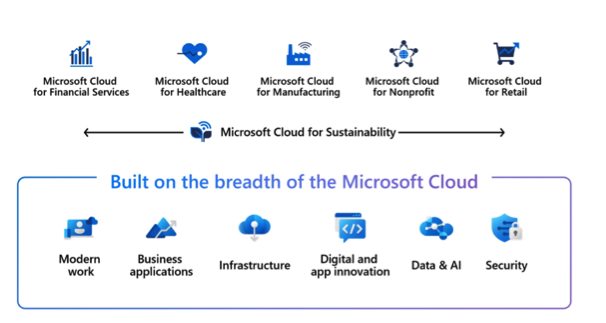
The News: Microsoft Cloud for Sustainability will soon be available for general use to help Microsoft customers achieve their sustainability goals. Staring June 1, capabilities from Microsoft Cloud for Sustainability are designed to help facilitate and accelerate a company’s sustainability journey — regardless of where they are starting from. Read the full announcement on the Microsoft blog.
Microsoft Cloud for Sustainability: Available for General Use Starting June 1
Analyst Take: Sustainability goals and initiatives are no longer a nice to have — today they are are a business imperative. In fact, we believe that sustainability is quickly rising to the same level of importance in the C-suite that digital transformation has been over the course of the last number of years, and with good reason. Customers care about sustainability, employees care about sustainability and we believe that interest and concern is going to continue to grow. It’s clear that Microsoft agrees.
That’s why Microsoft Cloud for Sustainability is a timely solution. Released last summer for public preview, the offering will be released for general availability on June 1. Microsoft’s Cloud for Sustainability offering will help companies accelerate their sustainability journeys, embed sustainability in everything, and discover new value with sustainability. Even more compelling, messaging around Microsoft Cloud for Sustainability is very compelling: it doesn’t matter where an organization is on their sustainability journey – this offering is designed to meet customers wherever they are in their sustainability journeys.
Microsoft Cloud for Sustainability sits on top of every cloud offering that Microsoft has, but it works within all the other offerings as well. Here’s a glimpse at what that looks like:

Image credit: Microsoft
What Users Can Expect from Microsoft Cloud for Sustainability
Microsoft Cloud for Sustainability is designed to bring together data management and other intelligence capabilities in a cloud-based platform to help organizations make decisions regarding their sustainability goals and initiatives with ease. The capabilities customers can expect from this offering include:
- Unified Data Intelligence. When it comes to sustainability, most organizations struggle with the same thing: a massive data problem. It is not at all uncommon to find that data exists in various states throughout the enterprise, often with limited visibility. The Microsoft offering was designed to address that challenge, helping organizations collect and connect data to provide the basis to monitor and measure activities at scale. Organizations will also gain the ability to record and report on their initiatives with a single source of truth.
- A Sustainable IT Infrastructure. One of the main goals we are consistently seeing from companies is the desire to replace tools and systems with more efficient options. As companies are migrating to cloud, or considering doing that, being able to see the impact of that decision is important. That’s why I was glad to see that the Microsoft Cloud for Sustainability includes an Emissions Impact Dashboard, designed to help organizations easily see what emissions have been reduced as a result of their use of cloud services and further build a sustainable IT Infrastructure. That way folks working on corporate sustainability initiatives don’t have to go to great lengths to make their case for sustainability initiatives — the dashboard makes that case for them. Tackling the thorny issue of responsible devices is another part of building a sustainable infrastructure throughout an organization, and I believe we are the beginning stages of having conversations about how to do this as part of sustainable infrastructure initiatives.
- Reducing the impact of operations. By leveraging its own vast experience on the sustainability front, along with a robust partner ecosystem, Microsoft aims to help organizations maximize organizational efficiencies, allowing them to reduce the environmental impact on their buildings and spaces.
- Sustainability throughout the value chain. Enterprise organizations don’t exist in silos. Partner ecosystems and value chains are all part of the sustainability equation. Digital technologies from Microsoft will help organizations drive integrity and gain visibility needed into their emissions processes in every part of the value chain.
Microsoft Cloud for Sustainability Partner Solutions
Speaking of partners, Microsoft can’t do this alone — these days almost no one can, and that’s not a bad thing. Thinking holistically about the partner ecosystem and what solutions everyone can bring to the table to address problems and solve needs is part of the value proposition here — and an attractive one. Partner solutions for Microsoft Cloud for Sustainability will help organizations plan and implement additional strategies to deliver sustainability progress. Some of the partners involved today in Microsoft Cloud for Sustainability include:

Image credit: Microsoft
We’ve worked directly with some of these partners before and what they are doing is both innovative and exciting. Seeing organizations like Honeywell, Ecovadis, Bentley, ABB, Iconics, Johnson Controls and TransparencyOne involved, with their partner solution offerings, BlueYonder and its transportation management solutions, and guidance and advisory from industry leaders and integrators like Accenture, Avande, Capgemini, EY, PWC, and Tata add much caché to the Microsoft Cloud for Sustainability offering. All partner solutions will be available and accessible through the partner portal, and we’ve been assured that this is only the beginning — there will be more partners to come.
Microsoft is No Stranger to Sustainability
Like many of the Big Tech players, ten years ago, Microsoft set an internal goal to reduce carbon emissions. In 2020, the company set an ambitious plan to be carbon negative by 2030 and to remove its historical carbon emissions by 2050. The company also pledged $1 billion to a climate innovation fund for the global development of carbon reduction. Other initiatives include sustainable data centers in Europe.
Microsoft Cloud for Sustainability is a smart solution and the time for it is most definitely right. Many organizations have set their own sustainability goals and objectives, now getting there is quickly becoming their biggest challenge. And figuring out the right technology solutions to add to the tech stack to make that possible is where attention is turning. I’m looking forward to GA of this offering on June 1st and then watching to see how it’s adopted and then I’ll look forward to seeing it in use and hearing some customer success stories.
Disclosure: Futurum Research is a research and advisory firm that engages or has engaged in research, analysis, and advisory services with many technology companies, including those mentioned in this article. The author does not hold any equity positions with any company mentioned in this article.
Analysis and opinions expressed herein are specific to the analyst individually and data and other information that might have been provided for validation, not those of Futurum Research as a whole.
Other insights from Futurum Research:
Microsoft Q3 Outpaces Expectations and Continues String of Record Quarters
The Future of Hybrid Work on Microsoft Windows 11 — More Inclusive, Secure, Seamless and Productive
Image Credit: Microsoft
The original version of this article was first published on Futurum Research.
Shelly Kramer is a Principal Analyst and Founding Partner at Futurum Research. A serial entrepreneur with a technology centric focus, she has worked alongside some of the world’s largest brands to embrace disruption and spur innovation, understand and address the realities of the connected customer, and help navigate the process of digital transformation. She brings 20 years' experience as a brand strategist to her work at Futurum, and has deep experience helping global companies with marketing challenges, GTM strategies, messaging development, and driving strategy and digital transformation for B2B brands across multiple verticals. Shelly's coverage areas include Collaboration/CX/SaaS, platforms, ESG, and Cybersecurity, as well as topics and trends related to the Future of Work, the transformation of the workplace and how people and technology are driving that transformation. A transplanted New Yorker, she has learned to love life in the Midwest, and has firsthand experience that some of the most innovative minds and most successful companies in the world also happen to live in “flyover country.”
Lauren Kirkpatrick is a junior analyst and project lead for Futurum Research. She covers topics ranging from corporate DEI and ESG initiatives, to cloud, mobility, and beyond. When she’s not working, she’s either chasing her dog, Whiskey, or cheering on her beloved LA Dodgers at the ballpark.


